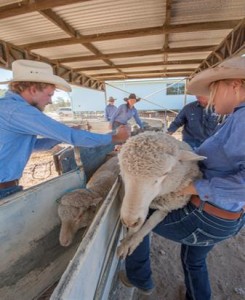Latest listings on Jobs Central recruitment page:
- Livestock Sales – Mt Barker (Primaries)
- Livestock Sales – Esperance (Primaries)
- QA Officer – Boning Room (Australian Meat Group)
- Meat Trader/Salesperson – Launceston (DR Johnston)
- Feedlot Manager – Cattle (Australian Food & Agriculture)
- Stockperson/Station-hand (Strathbogie Pastoral Co)
- Feedlot Manager – Grassdale (Mort & Co)
- Pen Riders – feedlot (Ceres Agricultural Co)
- Quality Manager – Meat Processing (4C Recruitment)
- Bovine Artificial Breeding Centre – Lab Technician (Rocky Repro)
- Administration Officer – Opal Creek Feedlot (Australian Country Choice)
- Senior Head stockperson/overseers (Consolidated Pastoral Co)
- Purchasing officer – Meat Export (Rimfire Resources client)
- Stockman/Penrider – Ravensworth feedlot (Ramps Ridge)
Click here to access these and other exciting meat and livestock supply chain jobs currently listed on Jobs Central.
FINDING quality staff can be a challenge, regardless of which segment of the meat and livestock supply chain your business is in.
It generally requires a solid recruitment strategy and process, the right staff training and finally, a plan to minimise staff turnover.
Building a great team is essential for continued growth in an agri-business and having the right team impacts the bottom line more than people realise.
Here are four points to consider in assisting in building a winning team:
Always be looking
The first challenge most meat and livestock sector business owners or managers face is the urgency of finding a new employee.
If an employee leaves suddenly or a business gets a surprising influx of work, there will be a natural urge to hire the best of a bad bunch.
Managers should use the good times to build relationships with experienced workers in their industry sector, and build networks before needing to employ.
Build a brand that attracts the right team
The majority of quality employees are already employed, therefore it is imperative that a business build a brand and reputation in the industry that will attract quality staff.
Make a name for yourself in the industry as an employer of choice and a business that has great working conditions.
This doesn’t necessarily mean the highest pay rate; it can also include flexible hours, workplace social events and career advancement opportunities such as training.
Have clear expectations from the start
Hiring the right team is only half the battle with their performance also needing to be managed.
Two simple strategies for managing performance include clear position descriptions and clearly defined policies.
Position descriptions are a simple agreement of a business’ expectations and what the employee is responsible for. A policy is a list of expectations about an employee’s their behaviour, e.g. smoking on site, uniforms, drugs and alcohol etc.
Set clear expectations from the start and you will have foundation for performance.
Clear set of values or philosophies
Make sure your business has a clear set of values and principles that can guide the way employees work.
A manager should think about how they want their team to behave, then make a list of mantras to match. These values should set the tone for the business’s culture and create a common purpose for employees.
Source: Meat Processors Pty Ltd


HAVE YOUR SAY